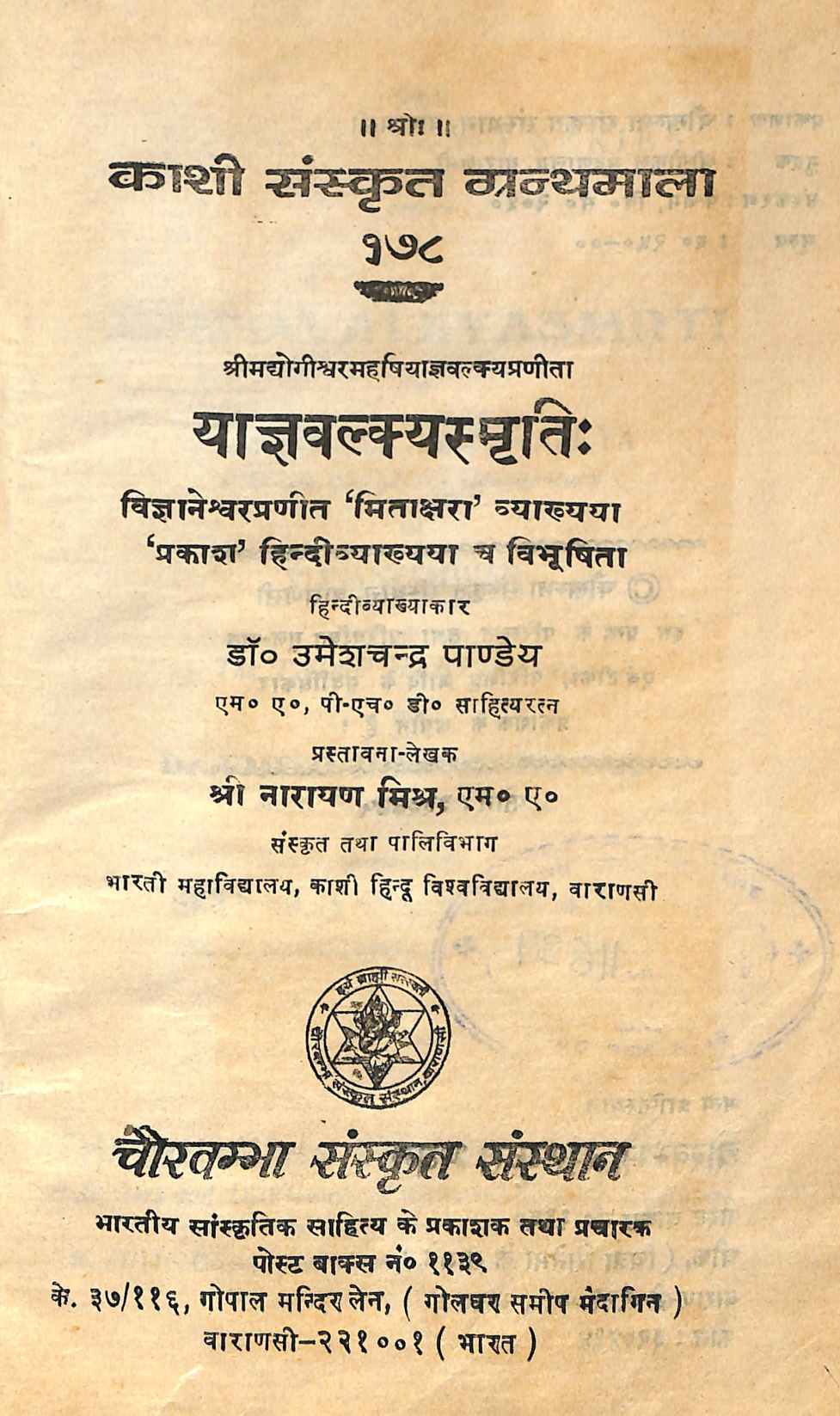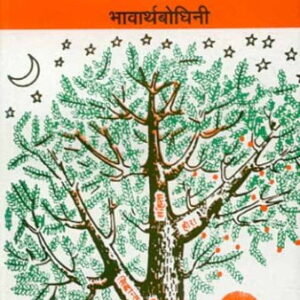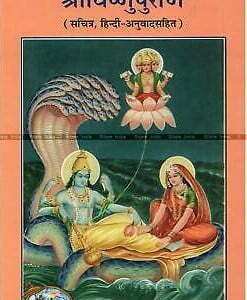Author: Maharshi Yajnavalkya
About the Translator: Translated in Hindi by Dr Umesh Chandra Pandey
Yajnavalkya Smriti : याज्ञवल्क्य स्मृति
Yajnavalkya Smriti is an important text in the Dharmashastra tradition, a genre of Sanskrit texts that provides guidelines on dharma (righteous conduct), law, and ethics. Attributed to the sage Yajnavalkya, this smriti is particularly significant for its systematic and comprehensive approach to various aspects of law and morality, making it a cornerstone of ancient Indian legal and ethical thought.
Overview of Yajnavalkya Smriti
- Authorship and Composition:
- The Yajnavalkya Smriti is attributed to the sage Yajnavalkya, who is also a prominent figure in the Brihadaranyaka Upanishad, known for his philosophical discourses on the nature of reality and the self.
- It is believed to have been composed around the 1st to 3rd centuries CE, although exact dating is difficult.
- Structure:
- The text is divided into three main sections: Achara (conduct), Vyavahara (legal procedure), and Prayaschitta (penance).
- Each section covers specific areas of law, ethics, and rituals, providing a detailed framework for personal and social conduct.
- Content and Themes:
- Achara: Focuses on daily conduct, rituals, and duties of individuals according to their varna (caste) and ashrama (stage of life).
- Vyavahara: Deals with civil and criminal law, covering topics such as property rights, contracts, inheritance, and judicial procedures.
- Prayaschitta: Prescribes penances and expiations for various sins and ethical transgressions, aiming to restore moral order.
Key Sections and Themes
- Achara (Conduct):
- It has 368 verses.
- This section outlines the duties and responsibilities of individuals in various stages of life, including students, householders, hermits, and renunciates.
- It includes guidelines on rituals, dietary rules, social interactions, and the performance of daily religious duties.
- The Acharadhyaya has a section on Grah Shanti. It talks about the nine planets and how to appease them through mantras and yajnas.
Many people question whether the fate can be changed. I have proved on this basis of Yajnavalkya Smriti and other scriptures that though the essential fate can’t be changed, the non-essentials can be changed by efforts. Watch this insightful video:
2. Vyavahara (Legal Procedure):
- It has 307 verses.
- The Vyavahara section is one of the most comprehensive legal codes in the Dharmashastra tradition, detailing the administration of justice and legal procedures.
- Topics covered include the roles and responsibilities of kings and judges, the process of litigation, evidence, and various types of legal disputes.
- It addresses civil matters such as marriage, divorce, inheritance, and property rights, as well as criminal offences and their punishments.
3. Prayaschitta (Penance):
- It has 335 verses.
- This section provides guidelines for atonement and penance for sins and moral lapses, emphasizing the restoration of dharma through corrective actions.
- It includes detailed prescriptions for various types of penances based on the severity of the transgression, aiming to purify the individual and society.
Significance and Influence
- Legal and Ethical Framework:
- The Yajnavalkya Smriti is highly regarded for its systematic and comprehensive approach to law and ethics, influencing later legal texts and commentaries.
- It served as a foundational text for the development of Hindu law, particularly in medieval and early modern India.
- Integration of Dharma and Law:
- The text seamlessly integrates ethical and moral principles with legal guidelines, emphasizing the role of dharma in maintaining social order and justice.
- It reflects the belief that law and morality are intertwined, with legal codes designed to uphold and promote righteous conduct.
- Philosophical Insights:
- While primarily a legal and ethical text, the Yajnavalkya Smriti also includes philosophical reflections on the nature of dharma, justice, and the duties of individuals and rulers.
- These insights provide a deeper understanding of the underlying principles guiding the text’s prescriptions and regulations.
Notable Features
- Comprehensive Coverage:
- The Yajnavalkya Smriti covers a wide range of topics, providing detailed guidelines on personal conduct, legal matters, and penance, making it a holistic guide to dharma.
- Its systematic structure and detailed prescriptions make it a valuable resource for understanding ancient Indian law and ethics.
- Influence on Later Texts:
- The text has had a significant influence on later legal and ethical writings, with many subsequent smritis and commentaries drawing on its guidelines and principles.
- It remains an important reference for scholars and practitioners of Hindu law and dharma.
- Cultural and Historical Importance:
- As one of the key texts in the Dharmashastra tradition, the Yajnavalkya Smriti provides valuable insights into the legal and ethical frameworks of ancient Indian society.
- It reflects the cultural and social values of its time, offering a window into the historical context in which it was composed.
The Yajnavalkya Smriti stands as a pivotal text in the Dharmashastra tradition, offering a comprehensive and systematic approach to law, ethics, and dharma. Attributed to the sage Yajnavalkya, it covers a broad spectrum of topics, from daily conduct and rituals to legal procedures and penances, integrating moral and ethical principles with practical guidelines for personal and social conduct. Its enduring influence on later legal texts and its role in shaping Hindu law and ethics highlight its significance as a cornerstone of ancient Indian legal and ethical thought.
Please also visit our blog JyotishRahasya for authentic scripture-based Kundali vishleshan (horoscope analysis) and kundli matchmaking. To watch educational videos based on Brihat Parashara Hora Shastra and other scriptures, also subscribe to our Jyotish Rahasya Youtube Channel.
Translations and Commentaries:
In Sanskrit there is a famous commentary by Vijnaneshwara called the Mitakshara. There is only one Hindi translation available in pdf format.
- Yajnavalkya Smriti Tr. By Dr Umesh Chandra Pandey. It also has Mitakshara commentary.
Yajnavalkya Smriti | याज्ञवल्क्य स्मृति
| लेखक : | Sage Yajnavalkya | महर्षि याज्ञवल्क्य |
|---|---|
| Book Language | हिंदी | Hindi |
| पुस्तक का साइज़ : | Yajnavalkya Smriti, Tr By Dr. Umesh Chandra Pandey (485 MB) |
| कुल पृष्ठ : | Yajnavalkya Smriti, Tr By Dr. Umesh Chandra Pandey (782 pages) |
| श्रेणी : | धार्मिक / Religious, साहित्य / Literature, हिंदू – Hinduism |
Yajnavalkya Smriti, Tr By Dr. Umesh Chandra Pandey (485 MB)






